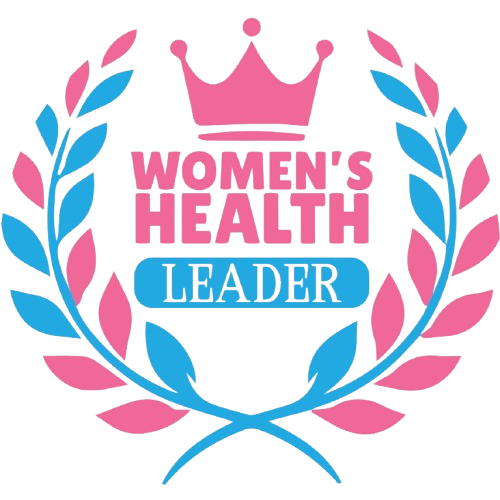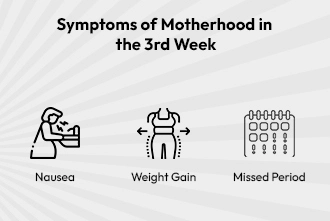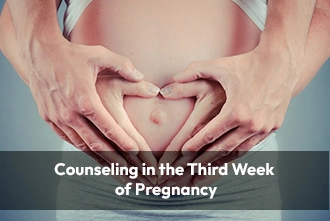
Dr. Aruna Ashok MBBS, MS OG, DNB OG
- Clinical Director


Entering the third week of pregnancy, you are embarking on an incredible journey. This week marks a crucial phase in your baby's development. At this stage, conception has occurred, and the fertilized egg has traveled down the fallopian tube, embedding itself into the lining of your uterus. This process, known as implantation, signifies the start of your baby's life.
During this week, your body is undergoing significant changes to support the growing embryo. Hormonal levels, particularly progesterone, are rising to maintain the uterine lining and support early pregnancy. This is a time of great anticipation and excitement. Your little one is just a cluster of cells, but these cells are rapidly dividing and forming the foundation for all future development.
Understanding these early stages can help you appreciate the miracle of life forming within you. It's a time to connect with your body and nurture it with love and care. Embrace the changes happening inside you and recognize that each day brings new developments.
As you navigate through this early stage, it’s essential to be mindful of your body and listen to its needs. Rest when you feel tired, eat nourishing foods, and stay hydrated. This period sets the stage for a healthy pregnancy journey.
At A4 Fertility Centre, we offer Birthing classes that provide comprehensive information on pregnancy stages, including the early weeks. Our classes help you understand what's happening inside your body and how to take care of yourself and your baby. Join us to learn more about the beautiful journey of pregnancy and connect with other expecting mothers.
How do you feel knowing that your body is nurturing new life? Are there any questions or concerns you have about this early stage?
In the third week of pregnancy, symptoms might not be very noticeable, but some women start to experience subtle changes. These symptoms are a result of hormonal changes as your body prepares to support the developing embryo.
One common symptom is light spotting or implantation bleeding. This occurs when the fertilized egg attaches itself to the uterine lining. It's usually light and lasts a day or two. You might also experience mild cramping, similar to menstrual cramps.
Another early symptom is breast tenderness. Your breasts might feel swollen or sore due to hormonal changes. This is a sign that your body is preparing for breastfeeding in the months to come.
Some women also report feeling more tired than usual. Fatigue is a common early pregnancy symptom caused by rising progesterone levels. Your body is working hard to support the pregnancy, and rest becomes essential.
You might also notice an increase in basal body temperature. This is a subtle change, but tracking your temperature can give you clues about your pregnancy.
It's important to remember that every woman is different, and symptoms can vary. Some women might not experience any noticeable symptoms in the third week, and that's perfectly normal too.
At A4 Fertility Centre, our Birthing classes cover the early signs of pregnancy and what to expect. We provide guidance on managing symptoms and taking care of yourself during these crucial early weeks.
How are you feeling in these early stages? Have you noticed any changes or symptoms? It's always good to share your experiences and get support from other expecting mothers.


Nutrition plays a vital role in supporting a healthy pregnancy from the very beginning. In the third week of pregnancy, focusing on a balanced diet is crucial. This ensures that your body gets the necessary nutrients to support the early stages of your baby's development.
Start by incorporating a variety of fruits and vegetables into your diet. These are rich in essential vitamins and minerals. Leafy greens like spinach and kale are particularly beneficial as they contain folic acid, which is vital for the baby's neural tube development.
Protein is another essential nutrient. Take in sources including lean meats, fish, eggs, and legumes in your meals. Protein supports the growth of the baby's tissues and organs. Fish is those rich in omega-3 fatty acids. This is prominent in fishes like salmon. They can help in the development of your baby's brain and eyes.
Dairy products are important for calcium intake. They help in the development of your baby's bones and teeth. If you're lactose intolerant or prefer non-dairy options, look for fortified alternatives such as almond milk or soy products.
Whole grains like brown rice, oats, and whole wheat bread provide necessary fiber and help maintain your energy levels. They are also a good source of iron, which is important to prevent anemia during pregnancy.
Hydration is key. Drink plenty of water throughout the day. Staying hydrated helps maintain the volume of amniotic fluid and supports overall blood volume, which increases during pregnancy.
At A4 Fertility Centre, our Birthing classes include sessions on nutrition and meal planning for pregnant women. We offer tips on how to maintain a balanced diet and address any dietary concerns you might have.
What foods have you been enjoying so far? Do you have any cravings or aversions? It's always interesting to see how our tastes change during pregnancy.
Pregnancy is a time when women experience significant emotional and physical changes. Counseling can be a valuable resource. It will be helpful during this period, especially in the early stages. In the third week, you might start experiencing a range of emotions, that includes from excitement and joy to anxiety and uncertainty.
Counseling ensures a safe space to express your feelings and concerns. It helps in managing the stress and anxiety that can accompany early pregnancy. A trained counselor can offer coping strategies and support, helping you navigate the emotional ups and downs.
Early pregnancy can also bring about changes in your relationship with your partner. Counseling can be of huge help for you and your partner to communicate better and understand each other's feelings and needs. This can strengthen your bond and prepare you both for the journey ahead.
Additionally, counseling can provide information and education about what to expect in the coming weeks and months. Understanding the changes happening in your body and the development of your baby can reduce anxiety and increase confidence.
At A4 Fertility Centre, we offer comprehensive counseling services as part of our Birthing classes. Our counselors are experienced in supporting pregnant women through all stages of pregnancy. They provide personalized guidance and support to help you have a positive pregnancy experience.
Have you considered counseling or joining a support group? It's always helpful to talk to someone who understands what you're going through.
In the third week of pregnancy, it's essential to start thinking about the necessary medical tests. Although it’s early, certain tests can help confirm your pregnancy and ensure everything is progressing well.
A home pregnancy test is often the first step. These tests detect the presence of the hormone hCG (human chorionic gonadotropin) in your urine. A positive result indicates that you are pregnant.
Once you have a positive home test, it’s time to schedule an appointment with your obstetrician. They might recommend a blood test to measure the exact levels of hCG. Blood tests can provide more accurate results and confirm the pregnancy.
Your doctor might also perform a transvaginal ultrasound. This early ultrasound can help determine the implantation site of the embryo and ensure it's in the right place. It can also provide information about the early development of the pregnancy.
In addition to these tests, your doctor will review your medical history and discuss any pre-existing conditions that might affect your pregnancy. They might recommend additional tests based on your health history.
It's also a good time to discuss prenatal vitamins with your doctor. These vitamins are crucial in the early stages of pregnancy, especially those containing folic acid, which helps prevent neural tube defects.
Another important test is to check your blood type and Rh factor. If you are Rh-negative and your partner is Rh-positive, there is a chance your baby could inherit the Rh-positive factor. This can lead to Rh incompatibility, which may require special monitoring and treatment to prevent complications.
It's also advisable to screen for sexually transmitted infections (STIs). Early detection and treatment of STIs can prevent complications for both you and your baby. Tests for HIV, syphilis, chlamydia, and gonorrhea are commonly performed to ensure a healthy pregnancy.
Screening for thyroid function is another important step. Thyroid hormones play a crucial role in the development of your baby's brain and nervous system. An imbalance in thyroid function can lead to complications, so it's important to address any issues early.
Glucose screening might also be recommended if you have a history of diabetes or are at risk of developing gestational diabetes. Managing blood sugar levels is crucial for your health and the baby's development.
At A4 Fertility Centre, our Birthing classes include information about the necessary tests and screenings during pregnancy. We guide you through each step and ensure you have all the information you need for a healthy pregnancy journey.
Monitoring your health through these tests provides peace of mind and helps in early detection of any potential issues. Regular check-ups and following your doctor's advice are key to a smooth and healthy pregnancy.
Have you scheduled your first appointment yet? It’s always reassuring to get professional confirmation and start your prenatal care journey. What questions do you have about the tests and screenings recommended for early pregnancy?